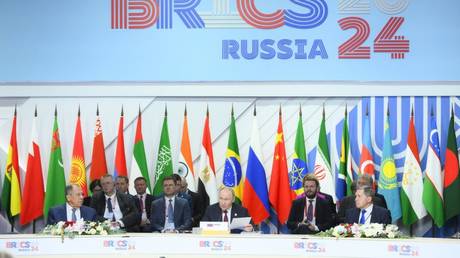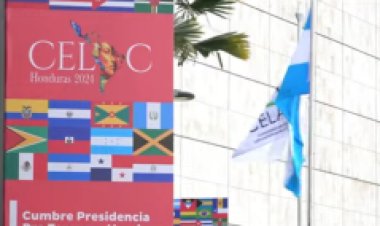Emerging Power Centers, Sovereign Equality, and Western Pressure: Insights from the BRICS Kazan Declaration
During a three-day summit in Kazan, Russia, the BRICS nations came together and approved a joint communique on Wednesday.

On Wednesday, the BRICS nations finalized a joint communiqué during their three-day summit in Kazan, Russia. This document addresses various global crises and challenges, advocating for a more equitable and just international order.
**New Centers of Power**
The BRICS nations reaffirmed their dedication to encouraging a multipolar world where every nation can participate equally in global discussions. The declaration emphasizes the need for enhanced representation of emerging and developing countries within international bodies.
“We note the emergence of new centers of power, policy decision-making, and economic growth, which can pave the way for a more equitable, just, democratic, and balanced multipolar world order,” the document stated, underscoring that such a structure would favor developing nations compared to the current Western-dominated system.
The BRICS countries highlighted the increasing influence of regional organizations like the African Union and the Shanghai Cooperation Organization. These entities are recognized as vital platforms for fostering economic collaboration, security, and cultural exchanges among member states. Additionally, the declaration called for a more robust World Trade Organization to address trade disputes and an expanded UN Security Council for improved representation of the Global South.
**Sovereign Equality and New BRICS Partners**
The group stressed the importance of allowing all nations to choose their development trajectories and manage their internal affairs without outside interference.
“We reaffirm our commitment to the BRICS spirit of mutual respect and understanding, sovereign equality, solidarity, democracy, openness, inclusiveness, collaboration, and consensus,” the group wrote.
The declaration also acknowledged the "considerable interest" from Global South countries in forming partnerships with BRICS, leading to the endorsement of a new category for BRICS Partner Countries.
“We strongly believe that extending the BRICS partnership with EMDCs emerging market and developing countries will further contribute to strengthening the spirit of solidarity and true international cooperation for the benefit of all,” it stated.
Current BRICS members include Brazil, Russia, India, China, South Africa, Ethiopia, Egypt, Iran, and the United Arab Emirates, with Saudi Arabia yet to ratify its membership. Given that nearly thirty countries are interested in joining, Moscow sees the creation of a BRICS Partner category as a strategic move for future expansion.
**Opposing Western Coercive Measures**
The declaration denounces all forms of sanctions and unilateral coercive actions, labeling them incompatible with international law and highlighting their significant impacts on human rights.
“We are deeply concerned about the disruptive effects of unlawful unilateral coercive measures, including illegal sanctions, on the world economy, international trade, and the achievement of sustainable development goals,” the declaration states, emphasizing that such measures disproportionately hurt the poor and vulnerable in targeted countries.
The group also criticized “unilateral measures introduced under the pretext of climate and environmental concerns” and condemned “unilateral protectionist measures that deliberately disrupt global supply and production chains and distort competition.”
“Acknowledging the role of BRICS members as the world’s largest producers of natural resources, we underscore the importance of strengthening cooperation among BRICS members across the entire value chain and agree to take joint actions to oppose unilateral protectionist measures,” the document declared.
**Non-Discriminatory Trade in Local Currencies**
“We recognize the widespread benefits of faster, lower-cost, more efficient, transparent, safe, and inclusive cross-border payment instruments based on minimizing trade barriers and ensuring non-discriminatory access,” the document states, likely in reference to Russia’s exclusion from the Western SWIFT payment system following the Ukraine conflict.
“We welcome the use of local currencies in financial transactions between BRICS countries and their trading partners,” it continues, advocating for the establishment of a BRICS Cross-Border Payments Initiative. The document also supports the BRICS New Development Bank's provision of funding in local currencies, aiming for it to become a “premier multilateral development institution.”
In his address at the summit, Russian President Vladimir Putin remarked that using local currencies over the dollar or euro “helps keep economic development free from politics as far as possible in today’s world.”
**The Middle East**
The BRICS Declaration underscores the need for enhancing global security through diplomacy, mediation, and inclusive dialogue. It acknowledged “the need to respect the legitimate and reasonable security concerns of all countries,” while emphasizing conflict prevention through addressing underlying issues.
“We reiterate our grave concern at the deterioration of the situation and humanitarian crisis in the Occupied Palestinian Territory, in particular the unprecedented escalation of violence in the Gaza Strip and in West Bank as a result of the Israeli military offensive,” the declaration reads, noting the humanitarian impact of Israeli operations.
The document also makes calls for Hamas to release Israeli hostages and urges Israel to cease military actions and withdraw from Gaza. It condemns Israeli bombing and ground operations in Lebanon, characterizing previous actions as a “terrorist attack.” Furthermore, the declaration denounces the “illegal foreign military presence” in Syria, highlighting the presence of approximately 800 U.S. troops disregarding Damasus' wishes, and criticizes Israel’s actions against Iranian assets in Syria.
**Ukraine**
Maintaining neutrality on the Russia-Ukraine conflict, the BRICS declaration refrained from taking sides. Instead, it stressed that “all states should act consistently with the Purposes and Principles of the UN Charter” and acknowledged proposals for mediation aimed at peacefully resolving the conflict through dialogue.
This approach resonates with a recent declaration by Brazil, China, and other nations in the 'Friends of Peace' group, advocating for a “comprehensive and lasting settlement” of the issue. However, Ukraine has rejected all peace initiatives except its own, which demands reparations from Russia and the restoration of its pre-1991 borders.
The Kazan Summit declaration did not emphasize the Ukrainian crisis, reflecting that it is not a primary concern for the economic bloc, as stated by Kremlin Spokesman Dmitry Peskov, who noted, “Yes, this is an important issue on the Russian agenda, but it is far from being the central issue for BRICS. And it was reflected exactly as much as it is supposed to be on the BRICS agenda.”
Frederick R Cook for TROIB News
Find more stories on the environment and climate change on TROIB/Planet Health












